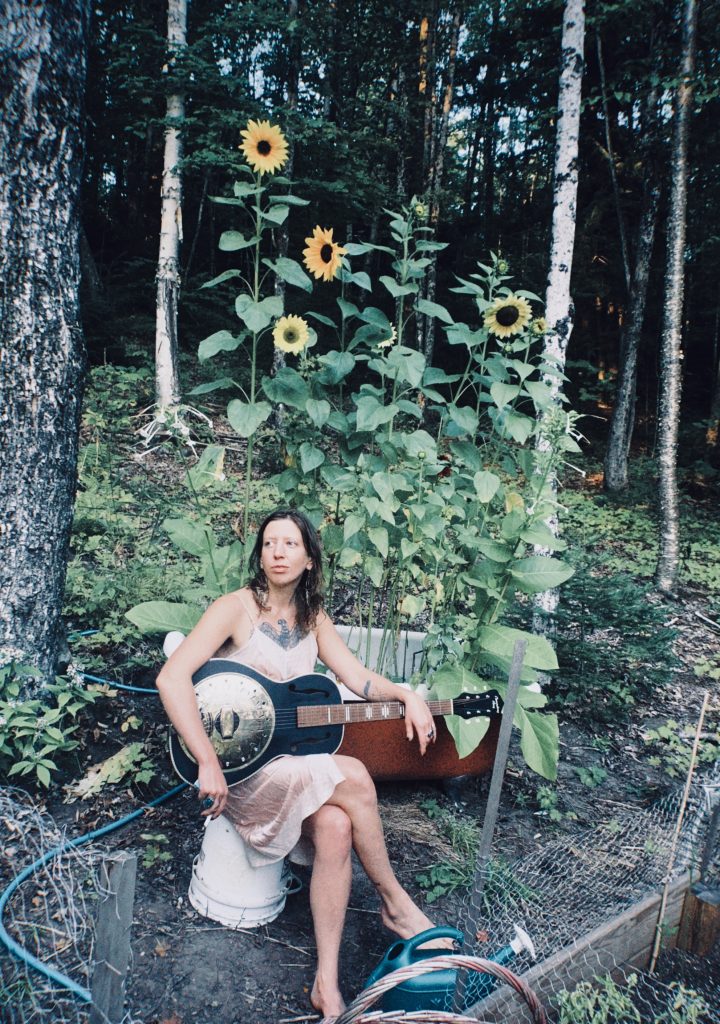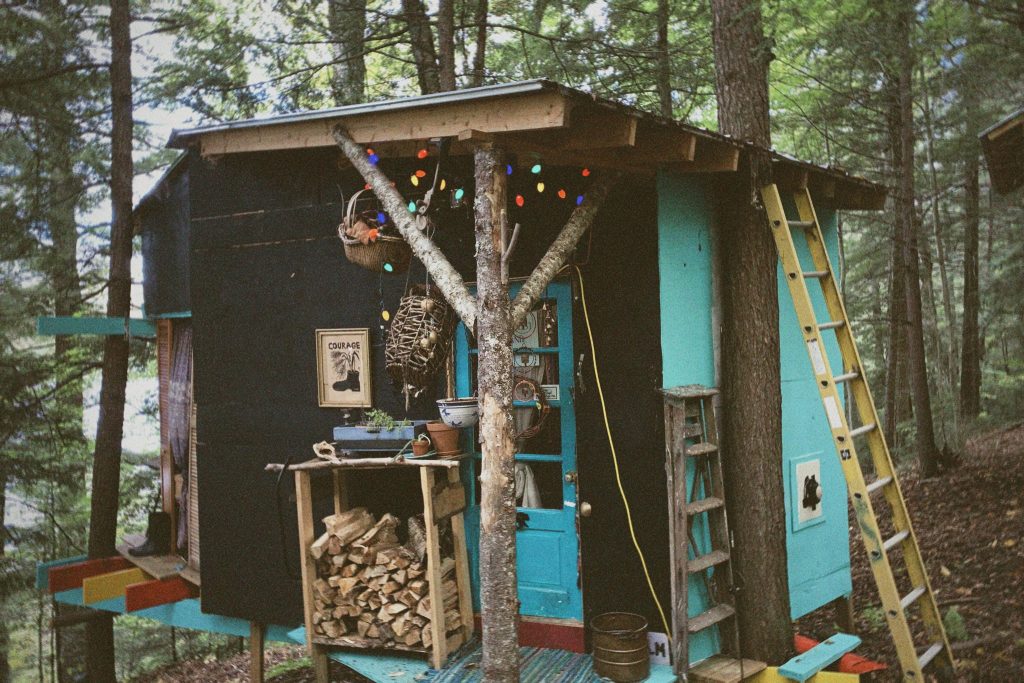Q&A With Johanna Rose
By Christopher Treacy & Johanna Rose

While combing through options for this week’s CQ Roundup, we were struck by the new EP from Vermonter Johanna Rose entitled ‘can’t love you from the ground,’ a five song window into the world of a heartbroken multi-instrumentalist who took life’s lemons and made some seriously tangy lemonade. Organic lemonade, naturally sweetened, and made with local lemons. It’s a fitting analogy for Rose, who lost their touring income as the pandemic dug its claws into 2020 (like so many folks) and chose to make the best of the resources available to her. Granted, not everybody would have the opportunities that they seized during such a crazy time, but rather than focusing on privilege—as is the tendency these days—we’re looking instead at an unstoppable spirit that shone through an awful time, and also the way that a little help from our friends can make something beautiful from something barren.
With an assist from their family, Rose solved the most pressing problem: finding a place to call home amid a housing shortage. The spirit of the Vermont woods definitely informs their new songs, coupled with a few seasons of self-realization. While a difficult-to-finger sense of dramatic intrigue pervades the five tracks on ‘can’t love your from the ground’, “Use It Up” jumped out for its contrasting light and dark… also, it’s easily the most ‘country’ feeling tune on the bunch. As they explain below, the song encompasses a useful philosophy that’s part of Rose’s DNA.
“Use It Up” covers some fairly serious terrain, but musically, it’s the lightest feeling track in the bunch. Was that a purposeful choice? Did the music come first?
I grew up with the old Vermont saying, “use it up, wear it out, make do, or do without,” and the chorus of this song is a play on that proverb. My family has old ties to Glover, VT which is also where Bread and Puppet Theater lives. They print a fabulous poster of this saying on their printing press, so I can’t recall if I heard folks saying it or saw it on their print first, but either way this song was surely planted a while ago. For me, when a song has that long to marinate, it usually comes out ready to go, which was definitely the case with “Use It Up.” The lyrics and music came at the same time, and although I’m talking about some of life’s harder lessons, it’s still pretty glorious to be alive, so I wanted to induce a kind of whimsied hopefulness with the melody.
This idea of making do or doing without is one of life’s harder lessons – taking things as they’re presented rather than trying to change them (which often doesn’t work). We learn to “live life on life’s terms.” It seems like you’re starting with an example of random life circumstances and them moving into more interpersonal terrain, applying the idea to a relationship. “Take me as I am or not at all.” Is that accurate?
Definitely, the idea of making do or doing without, but in addition to accepting what you got, there’s the notion of conservation with the first part of the proverb, “use it up, wear it out…” of doing the best you can with what you got, and resiliently trying to do it better. I wanted to apply these sentiments to some of the tricky situations life can throw at ya: the recklessness of youth, losing yourself in a relationship, and realizing your dreams. All the tough stuff. Part of the pep of the song is that there’s help along the way, life has guides. Although my father passed away seven years ago, his sage advice forever guides me, and as I’ve gotten a little older, it’s finally clicking. So, I worked that into the song with the lead into the chorus “my daddy always warned me…” followed by applicable dad wisdom. I think he would have appreciated that and would have liked the song.
How does your off-grid living inform the new songs? Was there a specific life event that proved to be the catalyst for living differently? Can you live in your treehouse year-round?
Well, my heart got broke, my band fell apart and then the world shut down, lol. Before the pandemic, I worked as a full-time touring musician and when I wasn’t on the road I worked as an audio engineer at local clubs in Milwaukee, WI. I’d been pretty much on the road for the four years prior to the pandemic so I was due for some soul searching.
My mom bought a hillside in Vermont, she’s got family all over the state, and she was spending the summer basically camping up there. So my sister and I drove out there and with the help of my sister and uncle and really my whole family, we built a treehouse. I know a treehouse sounds whimsical but keep in mind, it’s a hillside – there’s no flat spots and underneath 6 inches of soil is slate rock, so building a treehouse was really the most practical conclusion. We built it in 3 hemlocks, facing the lake down the hill. I didn’t have a big budget, but we were resourceful with the land, cutting a few trees for main supports and using rocks etc. We did a lot of “making do” on that project.
I hadn’t had a space that was just mine in almost a decade and I hadn’t stayed put anywhere for almost four years, so it felt pretty amazing, and Vermont’s such a beautiful place, it’s really inspiring. I’d historically played standup bass in projects, and written songs on piano, but Vermont makes you want to roam the hillsides with a guitar. I wanted to write songs that were lyric focused. I loved playing with folks and arranging instruments, but I wanted to write songs I could play solo on guitar and the story would still come across. I went back to Wisconsin for the winter of 2020, but in 2021 I got a wood stove and spent my first winter in the treehouse. That’s when I wrote and largely recorded, ‘can’t love you from the ground.’

“Carhartt Angel” makes for a powerful centerpiece for this set of songs, and it’s where the EP’s title comes from. It touches on the struggle to support ourselves and our loved ones in the throes of late-stage capitalism, something the pandemic really brought into ‘high relief.’ How do we make peace with a world that barely supports those who’re working the hardest? .
I think one way to support those who’re working hardest is to tell their stories. My heroes are folks like Hazel Dickens, Pete Seeger, Nina Simone, Woody Guthrie, and Paul Robeson, people who told the stories of working and marginalized people. Who could write a catchy tune that shed light on the struggle but still invoke an emotional reaction from the listener, maybe even inspire action. It’s definitely looking rough out there in 2022, but if you comb history, you can find a lot of moments where people banned together and fought for humanity, and sometimes even won.
Christopher Treacy has been writing about music and the music industry for 20 years. He’s contributed to The Boston Phoenix, The Boston Herald, Nashville Scene, and Berklee College of Music’s quarterly journal, as well as myriad LGBTQ+ outlets including the Edge Media Network, Between the Lines/Pride Source, Bay Windows and In Newsweekly. He’s the Managing Editor for CQ and lives in Waitsfield, VT.